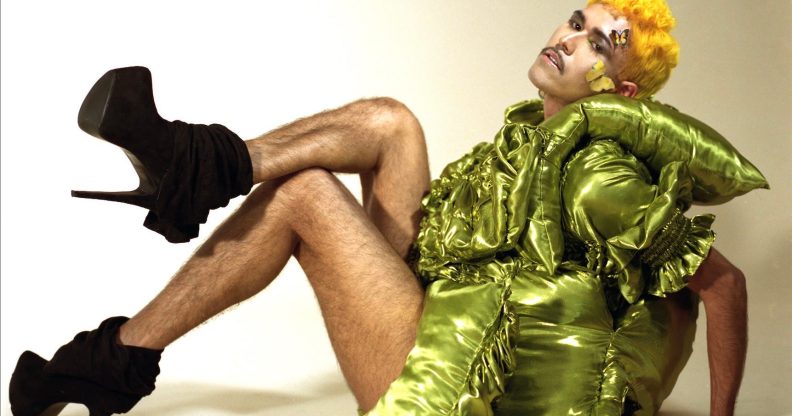The big problem for non-binary people like me isn’t just being seen – it’s being seen as human

Radam Ridwan: “There can be 100 people in a room discussing trans rights and 99 of them are cis and don’t believe in you.” (Jessica Ross)
For International Non-Binary People’s Day last year, Radam Ridwan wrote of the urgent need for allyship to go further. In 2021, their words ring just as true.
Dear reader: A real-life, living, breathing non-binary person here. Happy International Non-Binary People’s Day… today, I was spat at in Tesco. Finally, my day to shine!
I am not wasting space re-re-re-explaining “non-binary” to you because one, Google was invented in 1998, and two, I don’t want you assuming my non-binary is everyone’s non-binary. Can you explain what your gender means in 50 words or less?
Today is bittersweet for me. On the sweet side, International Non-Binary People’s Day gives me a chance to talk about my favourite obsession (myself), celebrate my binary-defying family, and raise awareness of the issues – still! – facing us. On the bitter side, I am aware that being seen isn’t the problem. It’s being seen as human.
Being seen isn’t the problem. It’s being seen as human.
In response to she-who-must-not-be-named, Paris Lees recently started the Twitter hashtag #TransPeopleAreRealPeople. While the hashtag rightfully celebrates the very real presence of trans and non-binary people, simply being seen as “not alien” is not enough. The realisation that we need a hashtag to show the world we are people at all truly crushed me.
It is no wonder that transgender and non-binary youth are at increased risk of depression, suicidal ideation, and attempted suicide compared with both cisgender heterosexuals and cisgender lesbian, gay, and bisexual people. The intersectional marginalisation of non-binary people – including the lack of control over our identity – is a significant contributor to these bleak statistics.
On awareness-raising days like this, the phrase “starting a conversation” is repeated. But how does conversation help when it is about us, not with us? Half of non-binary people do not disclose their gender identity at work and 24 per cent are not out at home because they are afraid of gender-based discrimination. The token non-binary participants in critical trans-rights debates are overwhelmed into silent agreement.
As Ally Maine would say: “There can be 100 people in a room discussing trans rights and 99 of them are cis and don’t believe in you.” Or something like that, anyway.
There can be 100 people discussing trans rights and 99 of them are cis and don’t believe in you.
Great efforts are made by allies to convince their following that trans women are women, trans men are men, and non-binary people are non-binary. Sadiq Khan was emphatically praised for tweeting these three sentences. This might appear like the right thing to do when transphobia reigns throughout the UK media. However, the challenge facing us seems insurmountable when conversations such as this begin and end at trans personhood.
This year, the rate at which trans people are murdered has risen to record numbers. I can’t help but wonder whether arguing with billionaire cis white fiction writers is a distraction trans people can’t afford. If these conversations are purely a practice in humanising trans people, rather than creating solutions to trans dehumanisation, throw them out and start again.
Arguing with billionaire cis white authors might be a distraction we can’t afford.
I am not advocating for the dissolution of International Non-Binary People’s Day, or for trans allies to stay silent in response to the haters – quite the opposite. I am insisting on reflexivity around our discussions. Why are they happening? Where are they happening? Who are they happening with? The conversation framework must be less “trans people are people” and more “trans people need our help”.
Our energy can be better expended than in the ceaseless Twitter debate cycle with people who refuse to see trans humanity. Use that energy to challenge your workplace on its inclusion and diversity practices. Send an email to your MP demanding Gender Recognition Act reform. Talk to your GP about how they can improve trans healthcare services. Read and share trans histories. Uplift trans voices. Celebrate trans victories.
There are better uses for our energy than the endless debate with people who refuse to see our humanity.
We are seeing an increase in recognition of trans and non-binary identities in the UK. A recent YouGov poll revealed that 50 per cent of the UK population surveyed were in favour of trans people self-identifying, compared with 27 per cent who opposed. Although I don’t take progress for granted, knowing my humanity is being decided on a five-point scale is rather demoralising.
Don’t mistake my message. We must take days such as International Non-Binary People’s Day seriously. We must challenge transphobic hate wherever we see it. But we can only effect material change if our response to systemic transphobia is proactive and supportive of its targets. A reactive approach merely destroys the conversation, not the system.
Our response to systemic transphobia must be proactive.
After I hit send on this International Non-Binary People’s Day article, I continue to be a real-life, living, breathing non-binary person. I continue to be acutely aware that my personhood is up for public debate. I continue to have my gender identity invalidated. I continue to receive death threats in my DMs. I continue to alter parts of myself to avoid discrimination. I continue to be spat at in Tesco.
And yet, I continue to live my truth.
Dear reader: If you’ve made it this far, I ask you – what will you do with your freedom?

